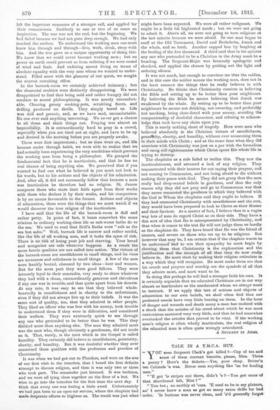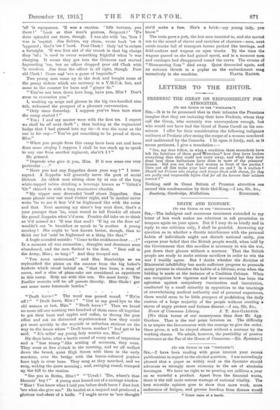TALK IN A Y.M.C.A. HUT.
" you seen Sergeant Clark's got killed 7—Cup of tea and some of them currant biscuits, please, Miss. Three a penny ? Hero's the tickets.—Yes, poor chap. Better'n
ten Colonels 'e was. Never seen anything like for leading men."
"'E got 'is stripes out there, didn't 'e 4—You got some of that shortbread left, Miss ? "
" You bet ; no earthly at 'ome. 'E used to be in my platoon, an' I never knew a man as got so many extra drills for bad other. 'Is buttons was never clean, and 'e'd generally forgot' 'alf 'is equipment. 'E was a caution. ' Idle buttons, you there I" Look at that man's puttees, Sergeant "E's done splendid out there, though. I was aht with 'im, 'fore I was in 'ospital. Jim Salters, my chum, wrote back 'ow it "appened ; that's 'ow I 'card. Poor Clark ! Only 'ad 'is stripes a fortnight. 'E was first aht of the trench in that big charge they 'ad ; 'o used to swear something frightful when 'o was charging. It seems they got into the Germane and started bayoneting 'cm, but an officer dropped poor old Clark with 'is revolver. Jim done the officer in all right, though. Poor old Clark I Come aa.:1 'ave a game of bagatelle."
Two young men came up to the desk and bought some of the penny tickets which are currency in a Y.M.C.A. hut, and came to the counter for buns and " ginger fir."
" You've not been down here long, have you, Miss ? Don't seem to remember you."
I, washing up mugs and glasses in the big two-handled zinc tub, welcomed the prospect of a pleasant conversation.
" Only since Saturday. I suppose you've been here since the camp started ? "
"Yes ; I and my master were with the first lot. I expect we shall be off next draft " ; then looking at the regimental badge that I had pinned into my tie—it was the same as the one in his cap—" You've got something to be proud of there, Miss."
" When you people from this camp have been out and have done HOMES btrafing I suppose I shall be too stuck up to speak to any one from another regiment, sha'n't I ? "
He grinned.
" Depends who give it you, Miss. If it was some one very particular . . ."
" Have you had any Zeppelins down your way ? " I inter- rupted. A Zeppelin will generally serve the part of social lifeboat. An oldish man sitting close by at one of the long white-topped tables drinking a beverage known as "'Orliok's tat " chimed in with a long ruminative chuckle.
" My nipper near drownded 'isseif about Zeppelins. One come plumb over our road t'other night, and 'is mother never
woke to see it fear 'e'd be frightened like with the noise and that. Next morning my sister's boy next door, that's a year younger than 'im, come round to tell Frankie all about the grand Zeppelin what 'e'd seen. Frankie did take on to think as 'e'd missed it I 'E was that mad ! 'E lay on the floor an' wouldn't eat 'is breakfast or speak to 'is mother. A young monkey 1 She ought to 'ave known better, though, than to think our lad 'ould be frightened at a thing like that."
A bugle sounded outside: " Come to the cookhouse door . . . 1" In a moment all was animation ; draughts and dominoes were abandoned, and the men flocked to the door. " Best call in the Army, Miss ; so long " And they trooped out.
"You must understand," said Mrs. Bainbridge as we replenished the plates on the counter from the big baker's baskets which stood behind us, that two buns, a mug of cocoa, and a slim of plum-cake are considered as appetizers in this camp. Help me with this urn. We must hurry. The Fusilier recruits will be off'• parade directly. Miss Slade I get out some more lemonade bottles." .
• . • .
" Draft leave 1 " The word was passed round. " We're 0 " Draft leave, Miss 1" " Got to say good-bye to the old woman at last, Mies." " Draft leave I " Then we heard no more till one morning two hundred of them came all together to get their buns and apples and coffee, to throng the post office and ask its distracted superintendent how they could get most quickly to the wayside or suburban stations on the way to the house whore " Draft leave, mother ! " had got to be said. " It's tellin' my young lady worries me, Miss."
Six days later, after a hectic round of every sort of inspection
and a " last trump "-like settling of accounts, they went. They went at five o'clock In the morning, and we all walked down the broad, quiet High Street with them in the early sunshine, over the bridge with the lemon-coloured poplars knee high in river haze. They sang as they marched, and we sang, waking the quiet morning ; and, swinging round, tramped up the hill to the station.
" See you in Berlin, Miss 1 " " 'Urrah I 'Ere, where's that bloomin' boy I " A young man leaned out of a carriage window. " Miss t You know what I told you before draft leave Just look 'ere what she give me." He hauled at a lanyard and produced a glorious tool-ohest of a knife. " I ought never to 'ave thought she'd make a fuse. She's a brick—my young lady, you know."
The train gave a jerk, the last men tumbled in, and she moved out to the sound of cheers and snatches of choruses—men, next cattle-trucks full of transport horses packed like herrings, and field-cookers and wagons on open trucks. By the time the wagons passed us she had gained speed, and in a moment men and carriages had disappeared round the curve. The strains of " Stammering Sam " died away. Quiet descended again, and an autumn thrush in a poplar on the embankment Ban











































 Previous page
Previous page